2010.11.02[Event Reports]
23rd Tokyo International Film Festival TOYOTA Earth Grand Prix Screening was presented by COREDO Muromachi on 11/1 (Mon).

The screening film was TOYOTA Earth Grand Prix award-winner, ŌĆ£WaterlifeŌĆØ, directed by Kevin McMahon.

Kevin McMahon appeared on stage for the greeting and put his feelings of joy for winning the award into words. ŌĆ£I am very honored to be able to win the award with this ŌĆ£WaterlifeŌĆØ. .
ŌĆ£I think that the environmental protection is a very important issue because peopleŌĆÖs life and the humanity are at stake. That is why I am glad that TIFF is actively focusing on the ecology and environmental protection. ŌĆ£
The research took over four years, one year to shoot the film and the post production took another year. We asked the director to talk about the struggle of making the film and the highlights of the film.
"Since I grew up near Niagara Falls, grew up surrounded by water.
The reason that I produced this film is because we humans are made of 60-70% of water and when you think of that fact, thinking of water means thinking about mankind.ŌĆØ

And as we conducted a survey about water, which will become the core of the story, it became very difficult to control my emotions because of the intertwined complex issues that arose...Knowing what is happening in reality, we had to continue shooting the film without losing our hopes.
But thanks to comments which I received from the Native American women, I was able to complete the film without losing my hopes.
WeŌĆÖve focused our film production on the Great Lakes (located in the border of United States and Canada). Since it is far from Japan, you might consider this issue to be irrelevant but this water flows from the lake to the sea, and then to the world. So, I want the audiences to take this matter seriously and see it not only as the story that happens in the foreign country but something that would involve the people around the world. "
Mr. McMahon (director) made his stage appearance, without showing any fatigue, on Sunday, one day after the end of the film festival.
The trophy of the TOYOTA Earth Grand Prix "is a beautiful trophy," he said as he raised it in the air with an air of shyness.
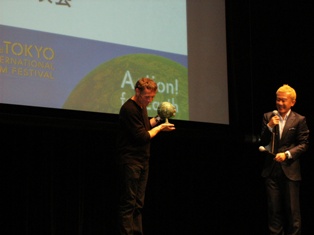
Screening of this film took place in Nihonbashi Mitsui Hall, with the courtesy of Mitsui Fudosan Co.,Ltd. Muromachi COREDOŌĆÖs Special Co-sponsorship..
:
Newly opened as a new attraction with a concept to enliven the Nihonbashi city in Japan and aspiring to transmit the new cultural information to the world from Nihonbashi, COREDO is planning to open various types of event in the future.
Nihonbashi Mitsui Hall’╝łJapanese Site)
COREDO Muromachi
2010.11.01[Interviews]
Competition ŌĆ£Intimate GrammarŌĆØ Interview with Nir Bergman (Director) and Orly Zilbershatz (Actress)

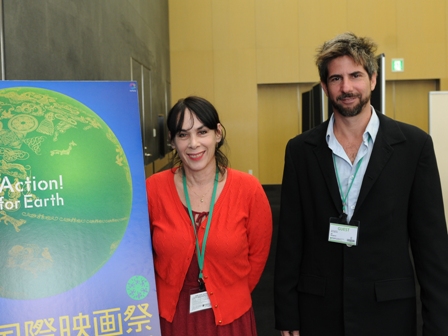
---Family may be an epitome of society, as well as an effective medium to explore deeper into the inner aspect of individuals, but why did you choose a story of a family again after your previous work?
Nir Bergman (Bergman): This film is set in the era of high spirits to create a new country where Holocaust would never happen again. The priority at the time is to build up military power more than anything, leaving no place for people with sensitive and artistic minds. I believe a story of an individual and relationship within a family is always an effective means to portray a country and society.
Another reason is that I myself am very interested in a dysfunctional family, and also I wanted to show a childhood before a child is bound by adultsŌĆÖ rules. Children of AharonŌĆÖs age wonder about all sorts of things. What Aharon questions is what people in modern Israel have ceased to question any longer as they concentrate their efforts on making the country strong.
This film calls for sympathy and care for people who are different. It has a strong message that everyone should mutually accept differences, not just within a family but in the whole region where Israelis and Palestinians live side by side.

---The films shows ceremonies such as Rite of passage and Bar Mitzvah that signify an individual joining a group, while Aharon repeats escapade attempts as Houdini, an escape artist. He also sneaks into a room belonging to his neighbor, Edna, and makes it as his hideout.
Bergman: Aharon is not capable of behaving like any other children. He has something different inside, and for that reason he needs to feel he is a special person, and that special person is for example an artist. In the scene of the ritual of fire, he has to go through the ring twice, but he is deemed arrogant and punished. Such a punishment will continue in his life. In the last scene of the Independence Day, did you notice Aharon is standing in a completely different group of people? Aharon must find the answer by himself how he can survive in the country.
---In EdonaŌĆÖs room which becomes AharonŌĆÖs hideout, pictures and books line the wall, but the trees outside are cut down, a wall is taken down, the piano is sold, and in the end it looks like a bomb site. Does this signify a social aspect?
Bergman: Perfect interpretation. That signifies the death of culture. Edna symbolises culture and art, and her room is the only place for Aharon to be in touch with such things. But Edna wants to be loved by AharonŌĆÖs father and asks him to take down the wall. The effect of war is not limited to the experience of war itself, but it destroys other things to create secondary trauma. Edna experiences this secondary trauma and is unloved. A lavish dinner with all family members does not mean the effect of war has gone. I wanted the audience to feel that the past remains with them.
---What is your interpretation of the mother?
Orly Zilbershatz (Zilbershatz): She is mean and aggressive, but she is a Holocaust survivor. Surviving was all they could do for people in those days. So she has no idea how to deal with a child with an artistŌĆÖs mind. She worries for his future so much as his mother. There is nothing good that can happen if he does not fit into society. So she is obsessed with the idea that he should not become a gentle man.
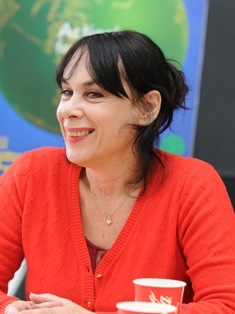
---You were in BergmanŌĆÖs previous film, too. How do you see the work with Bergman in terms of your career?
Zilbershatz: We have been friends for many years. Nir can bring out strengths which I did not even know I had, and I trust him completely. This film was a big challenge. The previous work was a success, so the temptation was there to make another film in the same way, but we wanted to avoid that. I played this mother in a way that I would feel satisfied for taking on a new challenge, even if this film was not perfect.
Aharon, who is learning English, shows a particular interest in the ŌĆśpresent progressive formŌĆÖ. His friends discard childhood as ŌĆśpastŌĆÖ in the process of growing up as adults, but Aharon refuses to so do. Similarly, Bergman reconstructs past and present, war and daily life, self and others in a present progressive form rather than discarding something. This film has explored such a profound world, and I would like to offer my heartfelt congratulations for achieving the Tokyo Sakura Grand Prix this year after 8 years.
Intimate Grammar
ŌåÆFilm Infomation
2010.10.31[Event Reports]
ŌĆ£Intimate GrammarŌĆØ Tokyo Sakura Grand Prix Award Winning Film, Screening & Stage Appearance (10/31)

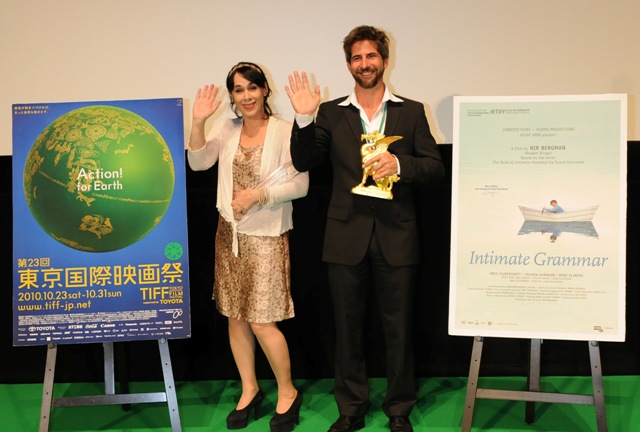
Zilbershatz added ŌĆ£Tokyo Sakura Grand Prix AwardZilbershatz embraced the trophy. And mentioned, ŌĆ£ItŌĆÖs very heavy. I thought there wouldnŌĆÖt be a second time. I am pleased to be awarded and I feel blessed.ŌĆØ
In the photo session that followed, the Director said, ŌĆ£I just canŌĆÖt stop smiling. ItŌĆÖs the best smile that I can show you.ŌĆØ
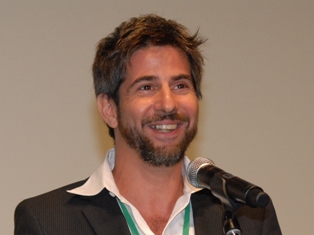
2010.10.31[Updates]
10/31 (Sun) President of the International Competition Jury, Comments at the Press Conference
After the announcement of the awards, the Awards Winners and the President of International Competition Jury held a Press Conference.
After 9days of the Festival and after the long day, the President of International Competition Jury, Neal Jordan had bushed looking and explained the judging process.

Competition Section President of the International Competition Jury
Neil Jordan: At some film festivals, the judges can watch a film with the audience, yet here, we had a small but beautiful cinema where we watched 3 films a day. After we watched all 15, not to degrade the other movies at all, there were 4 or 5 films that struck us all very strongly. In the end, it was a matter of how we acknowledged each of the films we watched, such as the acting, story, and message, and that is how we decided on the winners.
Also he commented at the Closing Ceremony as follow;
Neil Jordan: We watched all these 15 movies in a tiny theater. When watching one film after another, you forget that movies are actually made by people. Therefore, it's great to see the actors, directors, and producers come up on stage today. It's extraordinary that after so much discussion only 4 or 5 films come to the forefront.
Jordan also extended words to the 98-year-old director, Kaneto Shindo who won the Special Jury Prize.
Neil Jordan: When I was 16 years old, I saw 2 Shindo films in Dublin. I really loved those films. Back then, I didn't think I would become a film director, but I am honored to be part of the jury today with Mr. Shindo's film in the Competition Section.
After the Press Conference, the jury members, Domenico Procacci and Kichitaro Negishi also commented on the judging process and the winning films.
Domenico Procacci: There were many wonderful films in the Competition Section. Especially, the 3 films we narrowed down for the Tokyo Sakura Grand Prix were all a close race. We all discussed our opinions for a long time and in the end, it was a unanimous vote to select Intimate Grammar. I felt that this film was slightly above the other films. It portrayed a very interesting world through the eyes of a son, mother, and a father infatuated with a woman in the neighborhood.
Kichitaro Negishi: The quality of the films screened at the Tokyo International Film Festival is becoming higher each year. All the members of the jury felt that Intimate Grammar really captured the boyŌĆÖs changing feelings and loved the delicate story of the original novel. Nir Bergman won the Tokyo Sakura Grand Prix 8 years ago as well, and we felt that his second feature film took a significant leap forward since then.
2010.10.31[Updates]
10/31 (Sun) Press Conference of the Award Winners

Apart from above, here are some comment from other Award Winners at the Press Conference.
Ō¢ĀCompetition Section Award for Best Actor: Wang Qian-yuan (The Piano in a Factory)
Wang Qian-yuan: This is my first time to be in a film festival, the first time to be on a stage like this, and the first time to receive an award. It is truly a very special moment. I have been an actor for 10 years and this is a big encouragement. I immediately called 3 people to share this joy. First I called my wife who is here with my son and mother in law. My child wanted to know how good the prize was so I told him that it was the best one! I also called my sister in Japan and my parents in China. My parents are also actors. My father is in this film as well. He could not get the best actor award, but I was able to inherit what he has established as a career. I'd like to share this award with him.
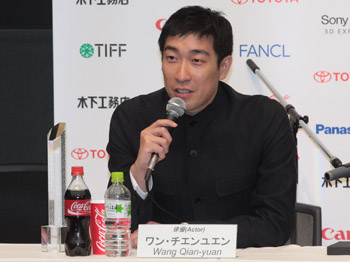
Ō¢ĀCompetition Section Award for Best Artistic Contribution: Buddha Mountain
Li Yu (director): This is my first to participate in this film festival. On the day of the screening I said I wanted the Asian audience to understand and enjoy my film and so I am so happy to receive this award. Fan Bingbing is in Korea filming at the moment but I e-mailed her telling her that she won the Best Actress Award. I am sure she will be very excited and I am very happy for her, too.
Fang Li (producer): This is my first time in Tokyo. Before the Closing Ceremony, Li Yu and I were talking about how we shouldn't keep our hopes up too high, that if we win, we're lucky. So maybe this is our beginners' luck. Our Director of Photography was very surprised when our movie title was called. I sincerely hope this movie will be screened in Japan as well.

Ō¢ĀBest Asian-Middle Eastern Film Award: Passerby #3
Shin Su-won (director): This is a low budget movie and will only be screened in small theaters in Korea. I'm happy that it was screened at such a big theater like Roppongi Hills. This film will be screened from November 18th in Korea. I was worried whether I would be able to shoot my next film, but this award is like an encouragement to continue making films. The Korean film industry was very active until a few years ago but overall, investors are decreasing. That's why for small budget movies like mine, which is a genre-vague film, they're becoming more difficult to make.

Ō¢ĀBest Asian-Middle Eastern Film Award Special Mention: The Tiger Factory
Edmund Yeo (producer): I'm based in Tokyo at the moment. I hope this will be the beginning of a beautiful relationship between Malaysia and Japan. Just two weeks ago, the short film spin off of The Tiger Factory called Inhalation won an award at the Pusan International Film Festival. I wanted to explain about Mei in The Tiger Factory so I decided to direct the short film. The director of The Tiger Factory, Woo Ming Jin, was the producer. I have been trying to write a feature film for the past months and hope to finish it in the next year or two!

Ō¢ĀJapanese Eyes Best Picture Award: hospitalité
Koji Fukada (director): Thank you for the opportunity to screen this film at this festival. This film was shot in Sumida Ward, downtown Tokyo. The local people were extremely helpful. The story is not based on my personal experience. I thought it would be interesting to make a movie about strangers being invited to stay at one's home. This movie was inspired by a Marx Brothers' movie idea, A Night of the Opera.

Ō¢ĀTOYOTA Earth Grand Prix: Waterlife
Kevin McMahon (director): I'd like to express my gratitude towards the judges that selected my film. This movie is about the lakes in Canada/North America. 20% of the earth's fresh water is from these lakes. I am grateful that this movie came half a world around and that it also resonates in the hearts of the Japanese people. You have to take a film with a grain of salt, that is, it's hard to judge a film. But the environment has all sorts of difficult and complicated issues and I am glad that I was able to express a part of them through my film.

2010.10.31[Updates]
10/31 (Sun) Special Jury Prize: "POST CARD" and Award for Best Director & Audience Award: Gilles Paquet-Brenner / "Sarah's Key", Press Conference Comments

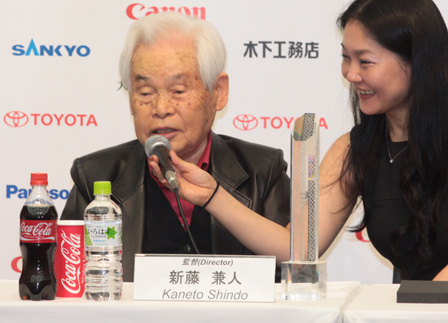
Ō¢ĀCompetition Section Special Jury Prize: POST CARD
Kaneto Shindo (director): In 1950, I established my own production. I had no money at first and it was hard work gathering money. But I kept my head high and looked ahead. The next moment, I was 98. This is my last film so I wanted to say what I really wanted to convey to the world. Some people tell me that this award might inspire me to make another film, but this is it. But the encouragement I received throughout the years had kept me going and you need that encouragement. A lot of energy and money is necessary to make a film. Making films is a wonderful job.
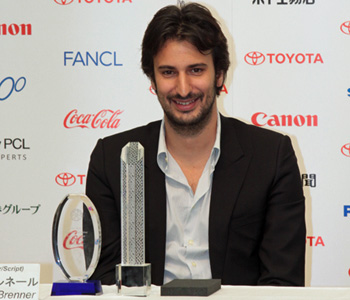
Ō¢ĀCompetition Section Award for Best Director & Audience Award: Gilles Paquet-Brenner / Sarah's Key
Gilles Paquet-Brenner: I am surprised that I got the Audience Award. I saw a lot of people crying when they were watching my film. It's good to cry to let your emotions go from time to time. There a are a lot of Sarahs today. There are also a lot of conflicts and we care but in a way, don't really care. But we are all connected in the world, so I want to tell the young people to 'care'. If you don't take action now, it'll come back to you quicker than you think. Getting the Best Director Award is really a very big honor and it really satisfies my ego! I really hope to shoot films when I am as old as Mr. Shindo.
2010.10.31[Updates]
10/31 (Sun) Tokyo Sakura Grand Prix: "Intimate Grammar" Press Conference

After the announcement of the awards, a Press Conference was held for the Awards Winners and the President of International Competition Jury at Roppongi academyhills 49F Tower Hall.
At the Ceremony, Nir Bergman, the winner of the Tokyo Sakura Grand Prix Award for his film, Intimate Grammar, started off by saying that he was sure his film was not going to win.
Nir Bergman (director): "My first feature film, Broken Wings won an award 8 years ago at the Tokyo International Film Festival. I believe that the process of making a film is important, not the prize, but after my second feature film, I realize that prizes are important to know my audience. Thank you so much for the wonderful award!"
At the Press Conference:

Nir Bergman (director): I am still so shocked and happy that I want to kiss this trophy! This is an amazing moment for us. I just want to kiss and hug Roee when I go home! I wish he could be here with us. 8 years ago we were here with Broken Wings. Back then I was so overwhelmed that I couldn't speak at all. I put all my life into my first film. But making a second film is usually much harder because people's expectations rise. That's why this award really means a lot to me.

Orly Zilbershatz (actress): A big honor! Arigato-gozaimasu! Roee will be very happy to have won this award since this is his first film. I wish I were nicer to him in the film! Many of the scenes I did were very difficult for me. I had to be bad to my son in almost an abusive way. As a mother of 3 children, this was so hard. Also, the immigrants who came to Israel reminded me of the HolocaustŌĆömy mother is from the Holocaust. This movie reminded me of things I didn't want to remember. But at the same time, having the opportunity to be a part of such a great film is a blessing when many people struggle to make films. My wish is that art will give hope to people and contribute to change the world.
2010.10.31[Event Reports]
Now Announcing Award Winners! Tokyo Sakura Grand Prix goes to "Intimate Grammar"

Tokyo Sakura Grand Prix
Intimate Grammar
Film Information
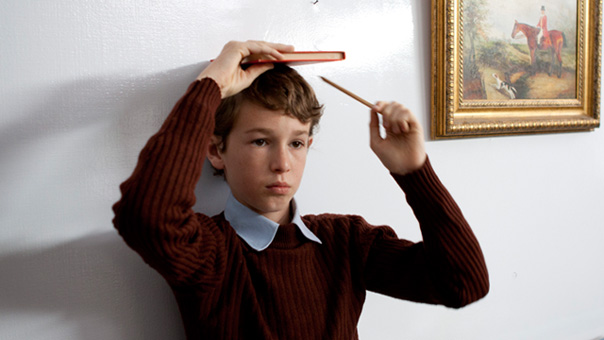
Special Jury Prize
POST CARD
Film Information
Award for Best Director
Gilles Paquet-Brenner
Sarah's Key
Film Information
Award for Best Actress
Fan Bingbing
Buddha Mountain
Film Information
Award for Best Actor
Wang Qian-yuan
The Piano in a Factory
Film Information
Award for Best Artistic Contribution
Buddha Mountain
Film Information
The Audience Award
Sarah's Key
Film Information
Best Asian-Middle Eastern Film Award
Passerby #3
Film Information
Winds of Asia-Middle East, Special Mention
The Tiger Factory
Film Information
Japanese Eyes, Best Picture Award
hospitalit├®
Film Information
TOYOTA Earth Grand Prix
Waterlife
Film Information
TOYOTA Earth Grand Prix Special Jury Prize
Nanga Parbat
Film Information
2010.10.30[Event Reports]
10/30 (Sat) Competition Section "Beautiful Boy" Press Conference: Notes & Quotes

Date & Time: October 30th (Saturday), from 13:00 @TIFF movie café
Appearance: Shawn Ku (Director/Writer)
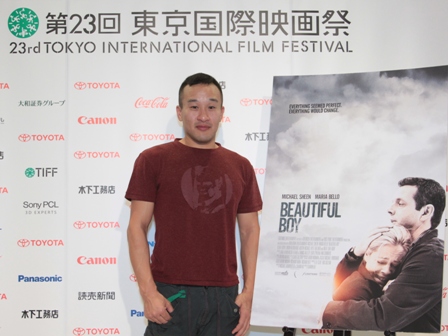
Here are some notes and quotes:
Shawn Ku (SK): This is my first feature film and this is our Asian Premiere. It's just fantastic to be in Tokyo.
Q: The theme of this film is about the conflict between a husband and wife, parent and child, and how they try to mend their relationship. It is based on the shooting that took place at Virginia Polytechnic Institute and State University in 2007. Did you actually interview those involved in this incident?
SK: It's difficult to get access to these people. As I was doing my research, I found that most of these parents had to live in anonymity so it was difficult to track them down. That's why most of the script writing was done through my self exploration. But a few weeks before we started shooting, a woman named Susan Klebold, who was one of the mothers of the boy who committed the Columbine High School Massacre, did a magazine interview with Oprah Winfrey. Maria Bello and I read the article together and we were instantly convinced that we were on the right track telling the right story. In the interview, Susan was trying so much to maintain the beauty of her son. She defended him and said that she still thought he was a victim of influences by other children. She was trying to keep him her beautiful boy.
Guns are a foreign thing for Japanese and certainly for me as well growing up not ever seeing a gun. Yet, I know for a lot of people in the United States, it's something they have around their homes. So I thought it was important for me to experience that. In the U.S., there are these places called shooting ranges where you shoot at paper targets. Shooting a weapon for the first time was a remarkable experience... it's so easy to pull the trigger and so easy to take a life. It was really a life changing experience for me.
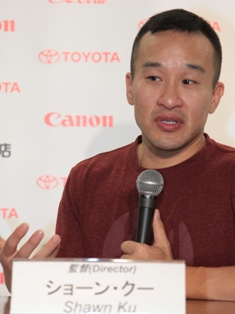
Q: What did you talk about with Michael Sheen about his role?
SK: When I first approached him to be in the film, we had a very long conversation. It was interesting that the approach of the 2 actors was different. Michael is a very cerebral actor in that he does a lot of searching and questioning. He is really internal and does a lot of thought building, trying to understand the person he is playing. I was excited to have him because most of the time he has played iconic people who exist such as Tony Blair and Brian Clough, a famous soccer coach, so it was fun to create someone with him from the ground up. We had a lot of conversations about life, family, children, and broken relationships. Maria and Michael have one interesting thing in common which is that they both are a single parent coming from a broken relationship, so most of our rehearsal sessions were conversationalŌĆötalking about the time before a relationship goes bad. Michael definitely understood what it's definitely like to be in a relationship that's not perfect so I guess it was quite easy for him to understand this role.
Maria's approach is more visceral. She tends to go by instinct, almost as if she is turning her mind off and just feeling things instinctually as they happen. This might sound negative, but she tends not to prepare and practice as much. She comes and feels her role as a human, mother, and wife. I think Michael and Maria are both appropriate for each of their roles in that way because the father in the role is very much in his head, and the mother is a person who very much reacts.
Shawn Ku also commented on one of his favorite Japanese films, Nobody Knows, directed by Hirokazu Koreeda. The story is about four children, each a child by a different father, who are abandoned by their mother and forced to survive on their own. It is based on the actual events of the four abandoned children in Sugamo, Tokyo, which came to light in 1988. Ku shared his thoughts on the film. "It's a beautiful film. I watched it with my cinematographer as we were thinking about our style. This film is very simple, real, and intimate which was definitely an inspiration for us"
Beautiful Boy
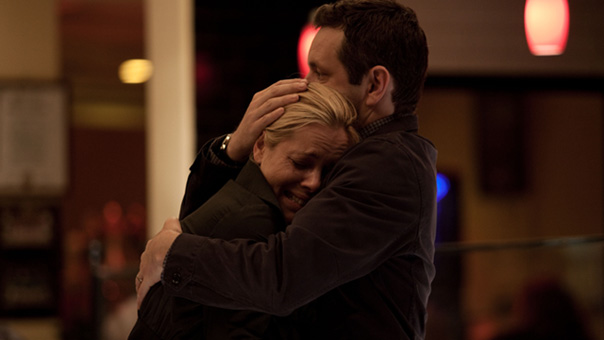
2010.10.30[Interviews]
Competition "Never Let Me Go" Interview with Mark Romanek (Director) (10/30)


"Never Let Me Go," director Mark Romanek's adaptation of Kazuo Ishiguro's bestselling novel, stars Carey Mulligan, Keira Knightley, and Andrew Garfield as childhood friends who grow up in a special English boarding school where the students are cultivated to fulfill preordained and disturbing destinies in a society that looks like ours but is different in one very fundamental way.
---The story is from a bestselling novel. What were the specific challenges you faced in turning it into a movie?
Well, it was beautifully adapted by Alex Garland as a screenplay for starters. But the specific challenges, I think, were that it's very delicate emotionally. The tone of it is very unusual. It's a science fiction story ostensibly, but there are no overt science fiction tropes in it. There are very few other films that are like that, so we didn't have many references. There was, maybe, Tarkovsky's "Stalker," or a little bit of Truffaut's "Fahrenheit 451." So I couldn't really rely on other films to go to as a reference point.
---Did you add or change anything to what was presented in the original novel?
Alex did an excellent job of selecting the right scenes in catching the essence of the novel. He's a novelist, as well, so I think he understands how to deconstruct a novel and then put it back together in another form better than someone else would. There are a few small but significant changes that were required. We added a few things, but we were all bonded in our common love of the book and wanted to be faithful to it. But just like all these types of adaptations, the film needs to feel as if it has a life of its own.
---You mentioned science fiction. The story takes place in our relative past but is in an alternate reality. Was that something you had to pay special attention to?
I was treating the science fiction as subtext. What's original about the tone of it as a futuristic concept is that it's set in an alternate past. But the emphasis of the film is the love story. I was just focusing on making a love story. I felt the science fiction ideas were implicit and created a certain amount of tension, strangeness, just by their mere existence. I didn't have to emphasize them visually or in any other way. Ishiguro writes with deceptively simple sentences. I was trying to capture some of that deceptive simplicity in the visual grammar.
---The movie is set in England and is very grounded in English culture, but do you think this story could have taken place anywhere else?
I suppose it could have, but I don't see what the advantage would have been. Ishiguro selected England, but he still retains a strong Japanese sensibility in his work. He was raised mainly in England but grew up in Nagasaki until he was six years old. One of the things that's unusual about this book and his other books is the way the Japanese sensibility becomes hybridized with wherever the books are set. This is sort of an English-Japanese sensibility. I think those two things create a symbiosis that's interesting. It's a lot about repressed emotion and denial of one's stronger urges to rebel or escape one's fate.
---What has been your sense of the audience's reaction to the movie, especially people who are unfamiliar with the book?
To be honest, it varies. People who connect with it, whether they've read the book or not, are very deeply moved. People are gutted by it and are weeping profusely at the end of the film and are unable to speak. I think it holds a mirror up to your life and asks a lot of disturbing questions, and if they're not comfortable with that some people seem not to connect with it. I find that the majority of people who have read the book and seen the film are very happy with the adaptation. They feel that it's faithful in its essence. People who haven't read the book approach it the same way that I did when I read it for the first time. All these small mysteries are revealed and there are twists and surprises. They seem to enjoy it.
---You said you see it as a love story. Is it also a cautionary tale?
It's cautionary, but not in the sense that it might show the terrors of bio-technology; or cautionary about the notion of using one's brief time here wisely. It's about these larger issues of our mortality and that we have a limited time span. The film asks you to consider the questions of what becomes important to you when you can't push that notion to the back of your mind any longer. If you're lucky you're only here for 80, 85, 90 years. I think Ishiguro is saying that the things that are important are love and friendship and treating people ethically and with respect. These are the things that are truly important, and we forget that very easily. And that's what he's cautioning us against: to not forget these things.
---Were the three principal actors your first choices?
There were, actually. Because the book is so beloved and because the adaptation was so good, we had quite a large selection of young actors to choose from. These were absolutely our first choices. When we all saw Carey in "An Education" we knew that we'd found the perfect Kathy. I had seen Andrew Garfield in a film called "Boy A," which was an extraordinarily good film that not a lot of people saw, unfortunately. But his performance in that film was as astonishing as Carey's was in "An Education." He's an amazing young actor. And then Keira approached us when she found out that Carey had been cast in the film. Her agent called us and said, "Have you cast Ruth yet?" She was keen to work with Carey. They're friends and she admires her work as an actor.
---I had formed a certain image of Keira Knightley, but her work here didn't fit that image at all.
She's wonderful in it, and I think she really relished the chance to play an antagonist in a less glamorous role.
---The three actors you got to play them as children resembled them quite a bit.
I was pretty strict about that. Obviously, we needed great young actors. They had to carry the first twenty minutes of the film. I find that in a lot of films that doesn't always work well, the hand-off from younger to older.
---It's difficult to pull off.
Especially with such unique individuals that we have here. But I really pushed for that. And my casting director, Kate Dowd, was very patient and looked at thousands of kids. They not only had to be terrific, but they had to really resemble their older counterparts.

---The movie is sombre but not oppressive, which seems like a difficult balance.
Ishiguro writes about these very sad, disturbing situations, but he writes them so beautifully, and he writes them with a gentleness. He delivers the message gently. So I wanted to mirror that with the film. I felt if it were not aesthetically beautiful it would be too bleak an experience. But it didn't feel right to film it in vivid colors. Everything in the film is old and hand-me-down and shows the passage of time. Their clothes are clothes they received from charitable donations. I didn't see that there was any other choice, but I wanted it to be aesthetically pleasing. And I think the music is quite beautiful, too, and helps make it not completely depressing. I find it quite moving and hopeful at the end, inspirational in the way Kathy so bravely just accepts her position in life, accepts the fact of her mortality. It's a very graceful example to follow.
---Is that what you think people will mainly take away from the film?
I've heard many people say they've called loved ones or relatives they hadn't spoken to in many weeks or months (after they see the film) because one forgets to cherish loved ones and family and friends. We take these things for granted. We forget that all this time is very precious. So if it's a gentle reminder of that for people, of how precious and short life is, then I think that's more than you get from a lot of films.
Never Let Me Go





